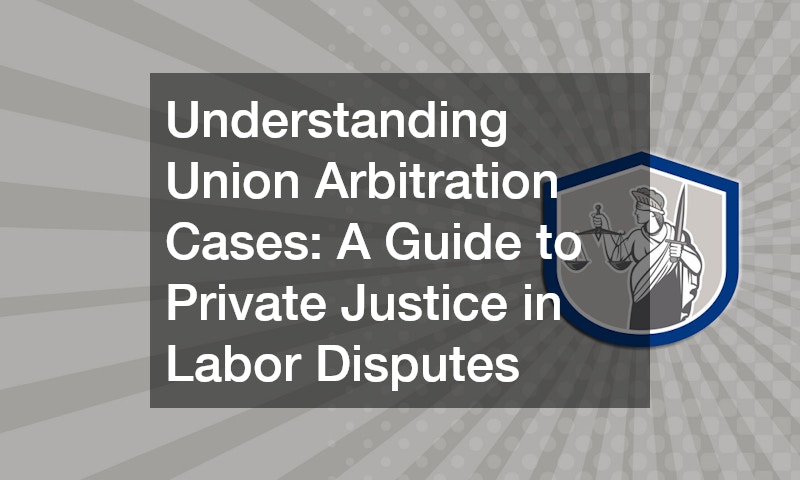
Understanding Union Arbitration Cases: A Guide to Private Justice in Labor Disputes
In labor disputes, arbitration is a pivotal alternative to traditional court proceedings. Union arbitration cases offer a structured method for resolving conflicts between employees and employers or unions without resorting to public court trials. This guide delves into the nuances of union arbitration cases, shedding light on how private justice operates within labor disputes and why it serves as a vital mechanism in the labor law landscape.
What is Union Arbitration? Union arbitration is a process where an impartial third party, known as an arbitrator, is appointed to resolve disputes between unions and employers. This form of arbitration is distinct from traditional court proceedings in that it provides a private forum for dispute resolution.
Unlike court cases, which are public and follow formal legal procedures, union arbitration cases are handled privately, allowing both parties to present their evidence and arguments to a neutral arbitrator who renders a binding decision.
The arbitration process typically begins when the parties involved agree to submit their dispute to arbitration. This agreement can be established through a collective bargaining agreement or a separate arbitration agreement. Once the arbitrator is chosen, they will hear the evidence, review the arguments, and decide based on the case’s merits. The outcome, known as the arbitration award, is intended to provide a fair and efficient resolution to the dispute.
The Arbitration Process In union arbitration cases, the process generally follows several key steps:
Agreement to Arbitrate: The parties involved agree to arbitration, either through a pre-existing agreement or by mutual consent. This agreement outlines the scope of the arbitration and the rules governing the process.
Selection of the Arbitrator: An impartial arbitrator is selected, either by mutual agreement of the parties or through an established panel. The arbitrator’s role is to act as a private judge, making decisions based on the evidence presented.
Presentation of Evidence: Both parties present their evidence and arguments to the arbitrator. This may include witness testimony, documents, and other relevant information.
Arbitration Hearing: The arbitrator conducts a hearing where both sides can make their case. This process is less formal than a court trial but still adheres to the rules of evidence and procedure.
Decision and Award: After reviewing the evidence and arguments, the arbitrator renders a decision, known as an arbitration award. This decision is typically binding, meaning that the parties are obligated to comply with it.
Enforcement: If a party refuses to comply with the arbitration award, the prevailing party may need to seek enforcement through the courts. In the United States, courts generally uphold arbitration awards, making enforcement a straightforward process.
Benefits of Union Arbitration Union arbitration cases offer several benefits compared to traditional litigation:
Privacy: Arbitration is conducted in private, protecting the confidentiality of the dispute and the parties involved. This privacy is particularly valuable in labor disputes where sensitive information may be at stake.
Efficiency: The arbitration process is generally faster than court proceedings, allowing for quicker resolutions. This efficiency is crucial in labor disputes where timely resolutions can help maintain workplace harmony and productivity.
Expertise: Arbitrators are often specialists in labor law and union matters, providing a level of expertise that can be beneficial in complex cases. Their knowledge ensures that the decision is informed by a deep understanding of the issues at hand.
Cost-Effectiveness: Arbitration can be less costly than litigation, as it avoids many of the expenses associated with a full court trial. This cost-effectiveness makes it an attractive option for many unions and employers.
Challenges and Considerations While union arbitration cases offer many advantages, they are not without challenges:
Limited Appeal: Arbitration awards are typically final and binding, with limited grounds for appeal. This means that parties must be prepared to accept the decision, even if they disagree with it.
Potential Bias: The selection of an arbitrator is crucial, as perceived or actual bias can affect the fairness of the decision. Ensuring a neutral and qualified arbitrator is essential for a just outcome.
Enforcement Issues: While enforcement of arbitration awards is generally straightforward, issues can arise if a party refuses to comply. Further legal action may be necessary to enforce the award in such cases.
Conclusion Union arbitration cases represent a vital aspect of labor dispute resolution, offering a private and efficient alternative to court proceedings. By understanding the arbitration process and its benefits, parties involved in labor disputes can make informed decisions about how to resolve their conflicts. Union arbitration decisions, rendered by impartial arbitrators, play a crucial role in maintaining fairness and efficiency in the workplace. Whether you are a union representative, an employer, or an employee, recognizing the value of arbitration can help you navigate the complexities of labor disputes and achieve equitable resolutions.
.




